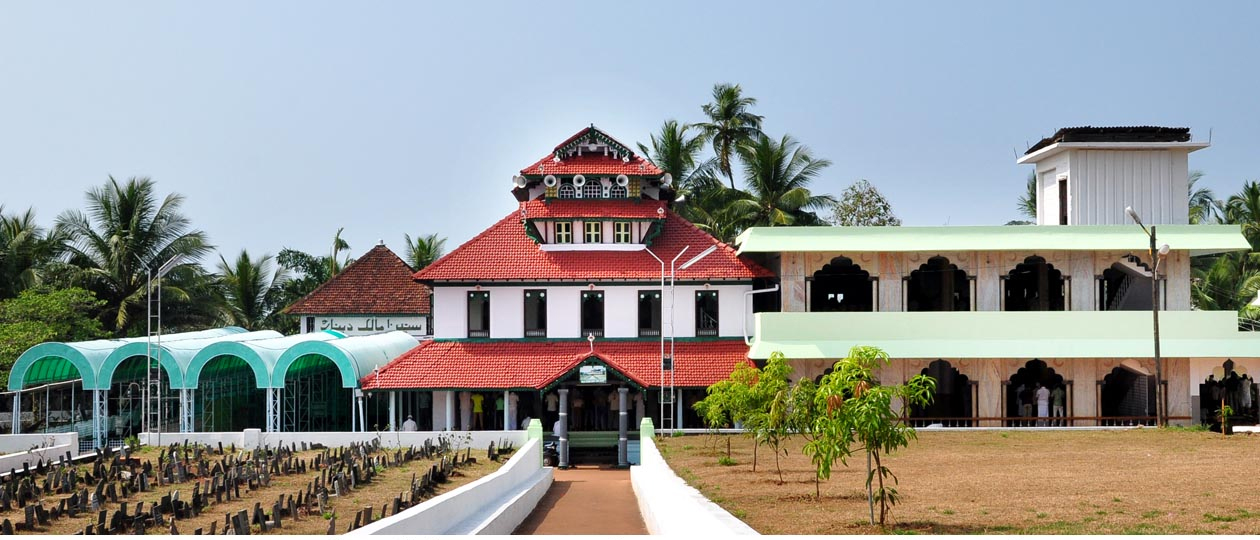
An Old Photograph of the Mosque
Dr.Mazhar
Naqvi
Malik
Deenar, the first follower of Prophet Muhammad to arrive in India, deserves
more awareness. His popularity is somewhat restricted to Kerala whereas he should
have been a household name among the Muslims of entire South Asia. The
historians differ whether Deenar was a ‘Sahabi’ (companion) of the Holy Prophet
or a Taabaeen(Successor of companions), it is widely accepted that
he died in 123 AH at Kasaragod and he lies buried at the Juma Mosque in Thalangara. He hailed from
Sijistan or Kabul. His father was a Persian slave. Deenar did not stay much at
his native place and moved to Basra where he became a disciple of mystic Hasan
al Basri.
Deenar devoted his himself to the
study of traditions. He learnt Hadiths (Traditions) from Basri and led a very
austere life. Deenar earned his livelihood by writing the Holy Quran. In his
life time, he also reportedly met Abdullah Ibn Abbas and Imam Maliki. Both
Malik Ibn Abbas and Ibn Sirin have called him a very pious and reliable
traditionalist.

Renovated Malik Deenar Mosque
The mosque is built in the typical Kerala style
architecture and one of the best kept and most attractive in Kasaragod.
Intricate carvings in Arabic can be seen on the wooden beams and pillars of the
mosque. The mosque details its history of construction in Arabic on the
latticed woodwork. History credits Deenar as being the first to being Islam on
Indian soil. In 624 AD, he and twelve of his trade associates landed in Kerala.
Their mission was not just to trade but to propagate Islam as well. His mission
is well-documented. He constructed mosques in many parts of Kerala. Some
historians call him as Malik Ibn Deenar and disapprove the spreading of Islam
in Prophet’s lifetime in India. They describe him as a Sufi saint and a disciple
of Hassan of Basra. The other historians say “ it is crystal clear his
biography that he never visited Kerala.
The real head of the well-known mission was Malik Deenar. He was the companion
the Prophet and the cousin of king Malik bin Habeeb, who was an eye witness of
famous miracle of moon splitting There is no bin between Malik and Deenar.
Deenar may be the surname given by natives as a sign of honor. History reveals
three arrivals of Malik Deenar. Firstly, he came under the leadership of Malik
bin Habeeb in a mission that caused the conversion of Hindu King Cheraman
Permal and his journey to Makka.
Second time, he arrived with the letter
of Perumal, in (21 H.E). In this period, he constructed mosques and returned to
Arabia. There he had to encounter insufferable political turmoil, unrest and
instability. He witnessed the brutality of newly emerged extremist sects of
Islam that led to his return to Kerala. Umar bin Suhrawardi, the author of ‘Rihlat al Mulk’ writes that Malik Deenar
had passed away when he reached Kasaragod. Despite differences in opinion, it
can be safely said that Malik played a significant role in propagation of Islam
in South Asia and its makes no difference to his contribution whether he was a merchant
or Saint. More research can be undertaken to unravel the mystery surrounding
the life of Malik Deenar. The local people hold him in high esteem as a saint
with miraculous powers and are least bothered about his history. They celebrate
their Urs (Death Anniversary) with much fanfare.
References:
1. Al-Dhahabi, Siyar a`lam al-nubala', vol. 5, p. 362.
2. Al-Hujwiri, "Kashf al-Mahjoob", 89
3. Ibn Nadim, "Fihrist", 1037
4. Bahadur
C Gopalan, Malayalttile Mappilamar
5. Rihlat
al Mulk
6-Photo Courtesy:Google Images
6-Photo Courtesy:Google Images
No comments:
Post a Comment